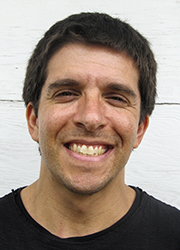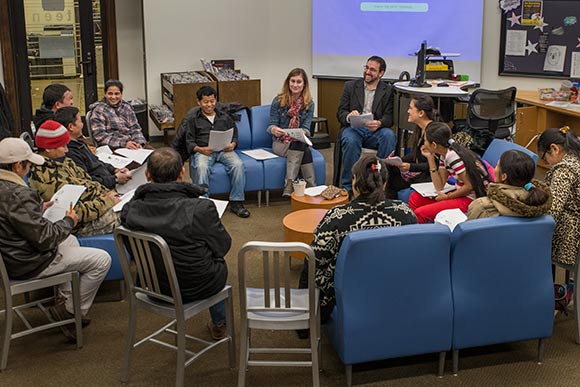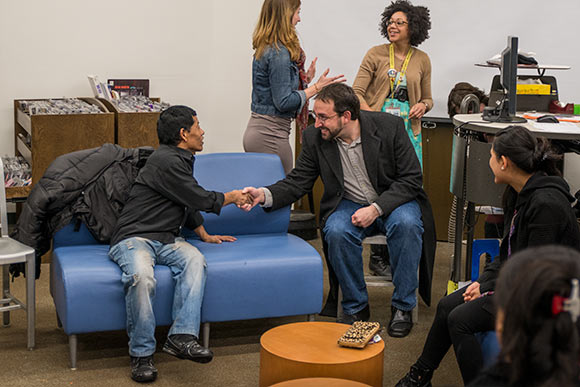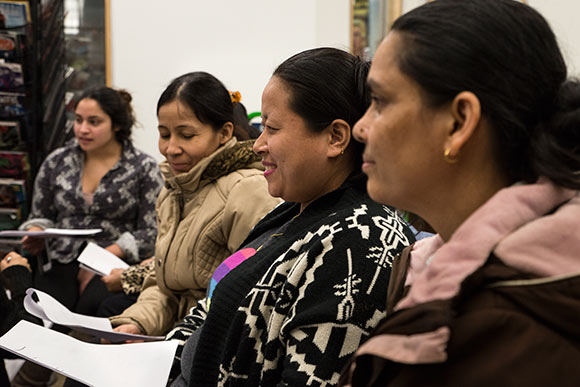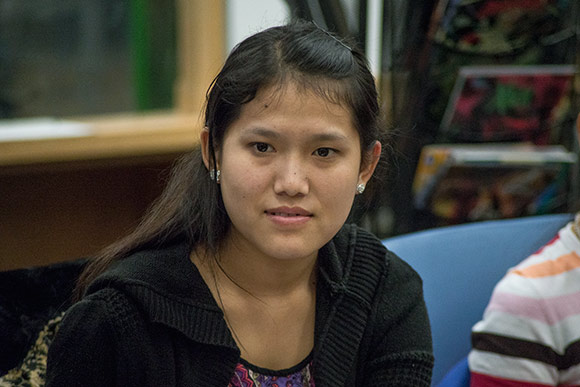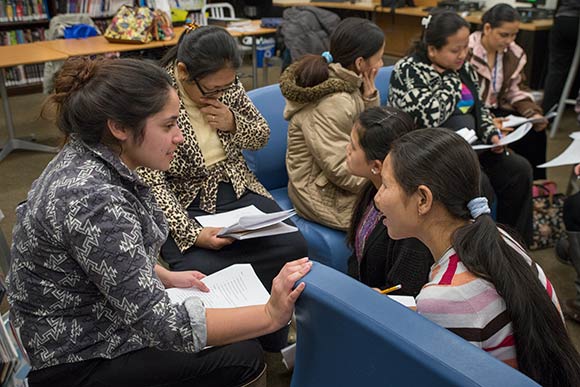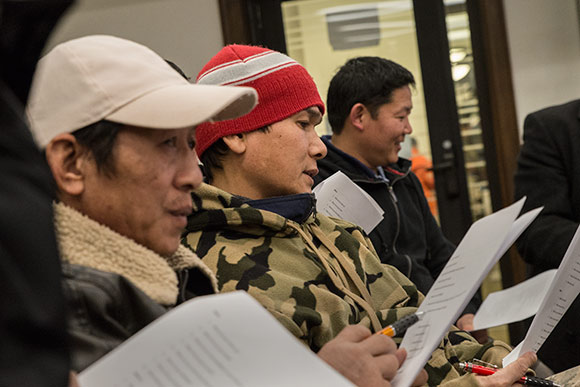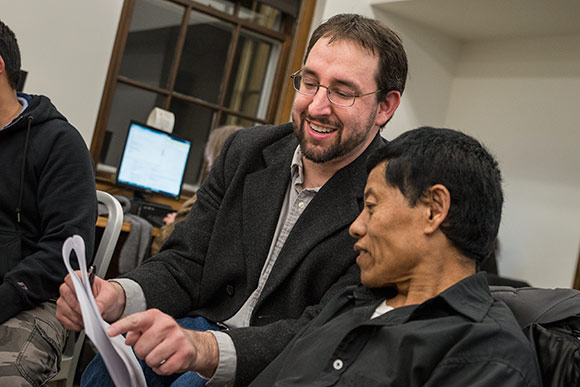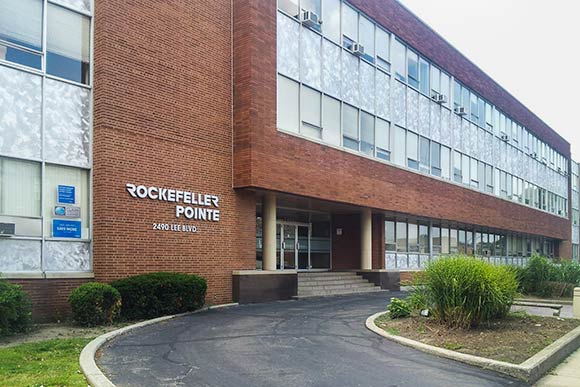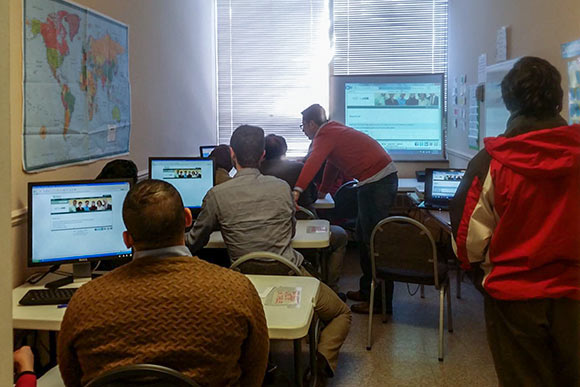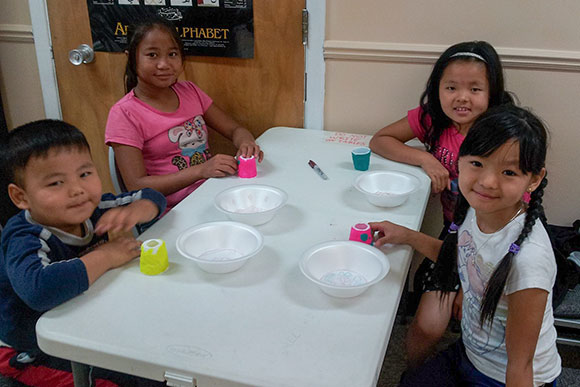Welcome hubs provide foreign-born with a Cleveland connection
On a recent February night, a dozen Nepali refugees gathered in the teen room of the Noble branch of the Cleveland Heights-University Heights library, reading and answering English-language questions like "Who is your best friend?" and "What is your favorite hobby?"
Mangal Singh Rai, who came to Cleveland three years ago from Nepal, is asked what he doesn't like about the city. "There's too much snow," he replies, wearing the affable grin he seems to carry throughout the two-hour meeting.
Rai, 32, is a ways from his native land, but nights at the library are an effective and snow-free substitute. "This class teaches me English, but it makes me feel like I'm home," he says.
 Mangal Singh Rai (right) says that the classes teach him English and makes him feel at home
Mangal Singh Rai (right) says that the classes teach him English and makes him feel at home
The class at the Noble Road library is taking place at what the nonprofit talent attractor Global Cleveland calls a "Welcome Hub." The hub is a pilot collaboration among Global Cleveland, the City of Cleveland Heights, the Cleveland Heights-University Heights School District, Cleveland Heights-University Heights library and US Together.
Created to serve as a resource for the growing number of refugees settling in the inner-ring suburb, the Noble Road hub is billed as a one-stop meeting point to help newcomers adjust to the region, providing participants with access to Global Cleveland’s information portal, globalcleveland.org, through dedicated computer terminals. Users also show up for maps of the area, RTA transportation guides and info about neighborhood services.
"We wanted a place for newcomers to go on an evening or weekend to get answers to their questions and whatever they need to connect to their communities," says Global Cleveland president Joy Roller. "The Cleveland Heights pilot is a great start and demonstrates how other hubs can be developed across the county."
Rolling out the welcome mat
Cleveland's Nepali population is largely comprised of Bhutanese people who had first migrated to Nepal decades ago, where they lived in refugee camps. Many were sent back to Bhutan, and then away from their homeland when its ruler decided they were too influenced by Nepali culture. There are currently around 3,000 Bhutanese refugees in Cleveland, with approximately 500 residing in Cleveland Heights and Richmond Heights, according to US Together.
 Meghan Murphy, a hub volunteer also teaches language at Cleveland Heights High School
Meghan Murphy, a hub volunteer also teaches language at Cleveland Heights High School
Meghan Murphy, a hub volunteer who teaches English at Cleveland Heights High School, sees the warmth and good company of the weekly events spreading halfway across the world to the friends and family of refugee participants.
"They're going to be talking about how welcoming we are," says Murphy. "These (hub events) can help Cleveland expand and become a world-renowned and global city."
The Cleveland Heights hub offers a human touch as well, provided primarily by Global Cleveland volunteers. Refugee students needing homework assistance can get it within the hub's friendly confines. ESL classes and citizenship testing help are among the other services the experimental Noble Road hub has been offering since launching last fall.
 "What we're giving these folks is a forum to connect to the community," says Mark Rodney, employment services coordinator for US Together, a Cleveland refugee resettlement agency.
"What we're giving these folks is a forum to connect to the community," says Mark Rodney, employment services coordinator for US Together, a Cleveland refugee resettlement agency.
Planning more welcome hubs
Murphy and Rodney are essentially voicing the overall goal of the hub initiative, should it grow beyond Cleveland Heights as planned. Program coordinators believe a wider collection of hubs will connect refugees to neighbors and help them make new friends. In turn, Cleveland will attain the reputation of being an inviting place to live, which ostensibly will attract more new residents.
Global Cleveland and its partners are seeking to build a hub network that includes Lakewood, Shaker Heights and Cleveland's Hispanic community. Though the response in Cleveland Heights has been positive, the venture is going to need active support to get a wider roll-out, says Roller.
Global Cleveland is currently in talks with Cuyahoga County Public Library and Cleveland Public Library about the creation of future hubs. Each would be individually staffed by either the nonprofit or by outside volunteers, a challenge when considering Cleveland is light on resettlement organizations overall. Along with US Together, the International Services Center and the Catholic Charities Diocese of Cleveland make up the entirety of regional resettlement efforts.
Early returns on the hub effort show Clevelanders are at least interested in the idea. "People are eager to be more global in Cleveland," Roller says. "They're seeking us out and volunteering to help."
The idea for community welcoming centers was formed last year, when Global Cleveland, in partnership with the city of Cleveland, held five community conversations with residents to discover what it means to be a welcoming city. After hearing from a panel of immigrants, refugees and city officials, Global Cleveland determined that an active grassroots network was needed for foreign-born newbies to thrive.
 Pashupati and Rukmina Adhikari at the Us Together facility after getting their US Citizenship in 2013
Pashupati and Rukmina Adhikari at the Us Together facility after getting their US Citizenship in 2013
Planting a seed for immigration
Cleveland's hub enterprise is based partly on a framework set by Welcoming America, a collaborative promoting cooperation between the native populace and those new to the country, notes Rodney of US Together. Cleveland's immigrant population needs this connection more than that of other cities, as nonprofits like US Together have a limited budget that makes it difficult to stretch beyond provision of basic needs like employment and home ownership.
"Hubs should be fostering self-sufficiency, where clients can connect with libraries, schools and social services independently," Rodney says. "People relying on a resettlement agency for continued services is not going to help them become independent."
With Cleveland ranking just 44th out of the nation's largest 50 metros in immigrant population, making life easier for those foreign-born who are here is an easy choice.
"When you're competing with other cities that have strong global presence, it's important to have some kind of edge," says Rodney.
Ultimately, an internationally fecund Cleveland can yield a crop of population base and economic development the city needs, its supporters say. A region-wide enclave of welcoming hubs may be the ray of sunlight required for this future to take root.
"A seed that falls onto fertile, welcoming ground will be nourished until it can grow," says Roller. "We want our refugees and immigrants to feel welcome, so they can thrive personally, financially and socially within our communities."
